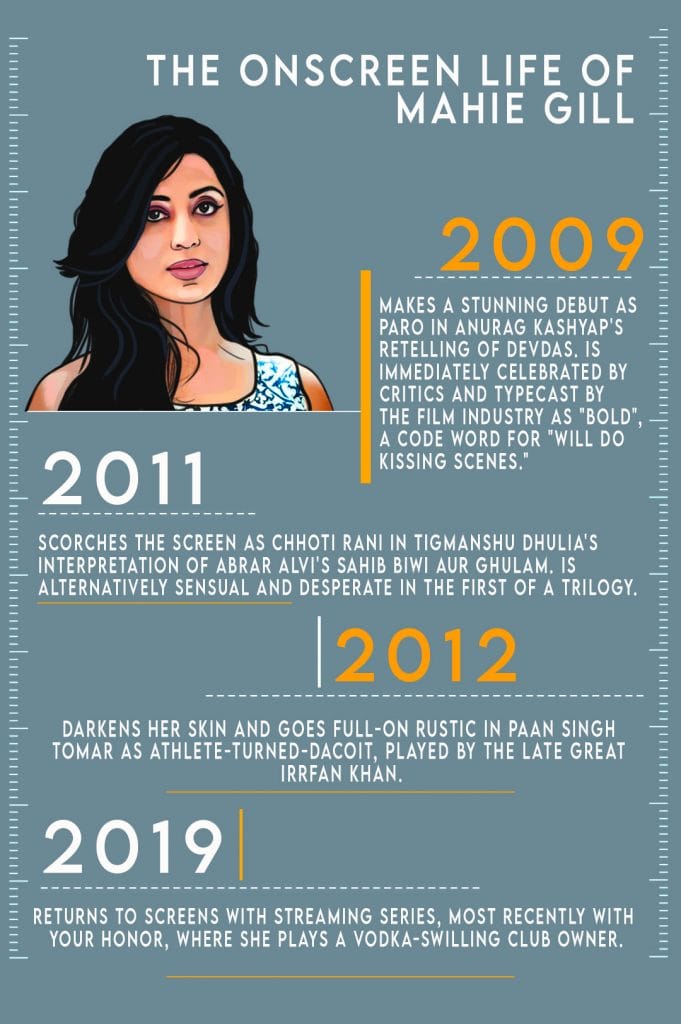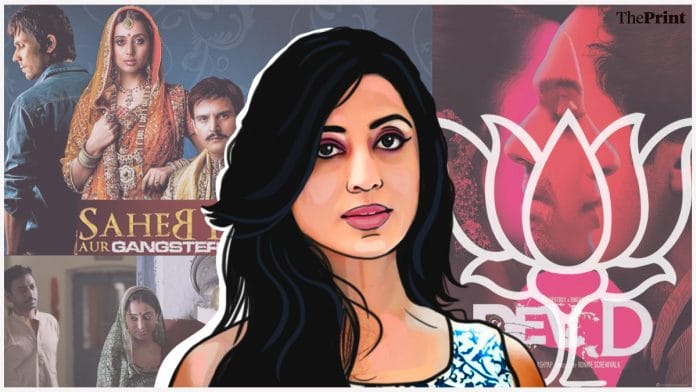Whatever happened to Mahie Gill? When she burst onto the big screen in 2009 in her first big film, Dev.D — Anurag Kashyap’s psychedelic adaptation of Devdas for the new millennium — she was hailed as the new Tabu; the thinking man’s pin-up; the new Indian woman’s true sensual representation. We, who had by then got accustomed to the westernised woman’s sexuality, were suddenly exposed to desi desirability. Here was a woman who rolled up a mattress on her cycle and took it to the fields to meet her London-returned beau, who danced wildly at her own wedding, and about whom it was infamously said in the movie: Khatarnak garmi hai uske andar (She’s dangerously hot). And who happily stripped her beau of his T-shirt only to exclaim, tere to bade baal hai (your chest is really hairy).
It’s a far cry from the newly-minted member of the Bharatiya Janata Party, infamous for boxing women into binaries of ‘sanskari Bharatiya naari’ and rootless cosmopolitan woman. Mahie has always played the antithesis of the ‘adarsh naari’, whether it is the Chhoti Bahu of Saheb Biwi aur Gangster (2011) who thinks nothing of reaching for her driver’s crotch (while he is driving) or breaking a pot of water at her husband’s feet in anger when he returns from the Army in Paan Singh Tomar (2012).
Queen of indie cinema
Mahie was the queen of indie cinema, the ‘chosen one’, who was cast by every major auteur from Kashyap to Tigmanshu Dhulia to Ram Gopal Verma (in the 2011 film, Not a Love Story). Her similarity to Tabu, the original ‘thinking man’s poster woman’, was not only talked about but also underlined, as in Gulaal (2009), where she played Madhuri, a beauty parlour owner whose walls are plastered with photos of a young Tabu and who listens to Vijaypath’s Ruk ruk ruk on her boombox.
There is little in Mahie’s filmography that suggests she would be suitable for the BJP. Even apart from Dev.D and the Saheb Biwi aur Gangster trilogy, she has usually been cast as a sexually voracious, independent-minded woman. Take her role as the always seductive Mona Darling in Apurva Lakhia’s Zanjeer (2013) or the free-spirited activist in Buddha in a Traffic Jam (2014).
Mahie, aka Rimpy Kaur Gill from Chandigarh, who came to Mumbai to become an actress at the age of 30 after opting out of the Army (she was one of the women selected for Short Service Commission at the Officers’ Training Academy in Chennai but quit when she nearly lost her life in a parachute accident), has had a full life outside the film industry. Her friend and frequent co-star Jimmy Shergill calls her a “multi-talented woman” with an eye for investments in hospitality and real estate. “I often joke with her to give me some tips on how to get rich,” he says.
But Mahie’s career, largely focused around the films of Kashyap and Dhulia, has never quite fulfilled its early potential. After her iconic Hindi film debut in Dev.D, she did Gulaal, also with Kashyap, who discovered her when he saw her dancing at actor Dibyendu Bhattacharya’s home and asked her to replicate that at the wedding onscreen. She then did the three-film franchise of Saheb Biwi Aur Gangster directed by Dhulia as well as Paan Singh Tomar. Of her role as Chhoti Rani in the film, the critic Bardwaj Rangan memorably said: “While most of our heroines look like little girls playing dress-up, Gill is a woman from head to toe, and she doesn’t shy away from seducing us with her ripe sexuality. She is lushly photographed like something of a fetish object herself. This is not a woman who will end up banished to an anonymous and ignominious death, only for her remains to be discovered by accident. As a character remarks with not a little trepidation, ‘Chhoti Rani bali mangegi.’ Others will die for her.’”
So, to repeat, what happened?
Also Read: ‘What does Sara Ali Khan do?’ Wears her third-gen privilege proudly in Bollywood
Being typecast into roles
“After Saheb Biwi aur Gangster, I was expected to wear a sari, look hot, smoke and drink. I have nothing against that,” Mahie told me once in an interview, “but that is not all that I can do.” Add to that a tiny role as Arbaaz Khan’s girlfriend in Anubhav Kashyap’s Dabangg (2010) and she truly fell off the map. “I had three or four movies where I was playing the lead and those filmmakers just backed off, saying I was no longer supposed to be heroine material.” She became a secondary character, the love interest of the second lead, while Sonakshi Sinha cornered all the praise, cast against Salman Khan.
And in Bollywood, it is very difficult to get out of an image trap. Manu Rishi, Mahie’s co-star in Doordarshan (2020), a rare comedy she acted in says: “Every actor wants variety, but once the film industry creates an image for you, that’s the only kind of work you’ll get. We actors try to fight this image but it also becomes a means of survival through which we keep getting work.” He adds that he would love the world to see the polite and humourous side of Mahie and Richa Chadha, who he feels have got typecast in “bold” roles.
Senior journalist Jaideep Pandey says the number of strong, realistic movies requiring characters such as Mahie was limited by theatrical distribution in the 2010s. It is only now, with the arrival of streaming services, that actresses like her are being fleshed out in scripts as fully-evolved characters.
And then there’s the Anurag Kashyap cage. Once you get cast in a Kashyap movie, says Rishi, there are enormous benefits, but it is then difficult to get light-hearted roles. Everyone can only see the actor from a particular, intense prism.
Also Read: Why Bollywood needs a Parvathy Thiruvothu — an actress not afraid of the F-word

Mahie Gill’s chequered history
Born to a lecturer mother and bureaucrat father, Mahie did her post-graduation in theatre from Panjab University. Rishi says he sees in Mahie the typical ladli ladki (darling daughter) in Punjabi families who are allowed everything and forgiven everything. “She may have a bold image but the Mahie I worked with is a fun foodie,” he says.
Her personal history has been chequered. After her first marriage ended in divorce when she was very young, which she has referred to in interviews, she tried the Army, and then theatre, which brought her to Punjabi and then Hindi cinema. She has said in interviews how she went to parties for a year after moving to Mumbai in 2004 because she thought that was the way to get work. Being cast as Paro in Dev.D transformed her career. The role won her the Filmfare Critics Award for Best Actress and the International Indian Film Academy’s (IIFA) best debutant award in 2010. She was on the red carpet at the Venice Film Festival, even as the film travelled the festival circuit, heralding a new wave of Indian cinema.
Now a single mother to five-year-old girl Veronica, she lives with her boyfriend in Goa, and sometimes in Mumbai. She’s still very much connected to her family — her mother lives in the US as do her two brothers. Her career has seen a minor resurgence thanks to streaming but whether in Sony Liv’s Your Honor 2, set in Punjab, where she has to play the sensuous sari-clad club owner who adores her cocaine-addicted singer brother or in MX Player series Raktanchal 2 where she plays a politician with shades of former Uttar Pradesh chief minister Mayawati — roles barely do justice to her talent.
Her co-star in Your Honor 2, Mita Vashisht, says Mahie is a “sweet, simple person. She’s very easy to work with. There is something intrinsically genuine about her”. As Mahie Gill campaigned for the BJP in Punjab, moving from street to street, locality to locality, the party must be hoping this authenticity translates into much-needed votes.
(Edited by Srinjoy Dey)






